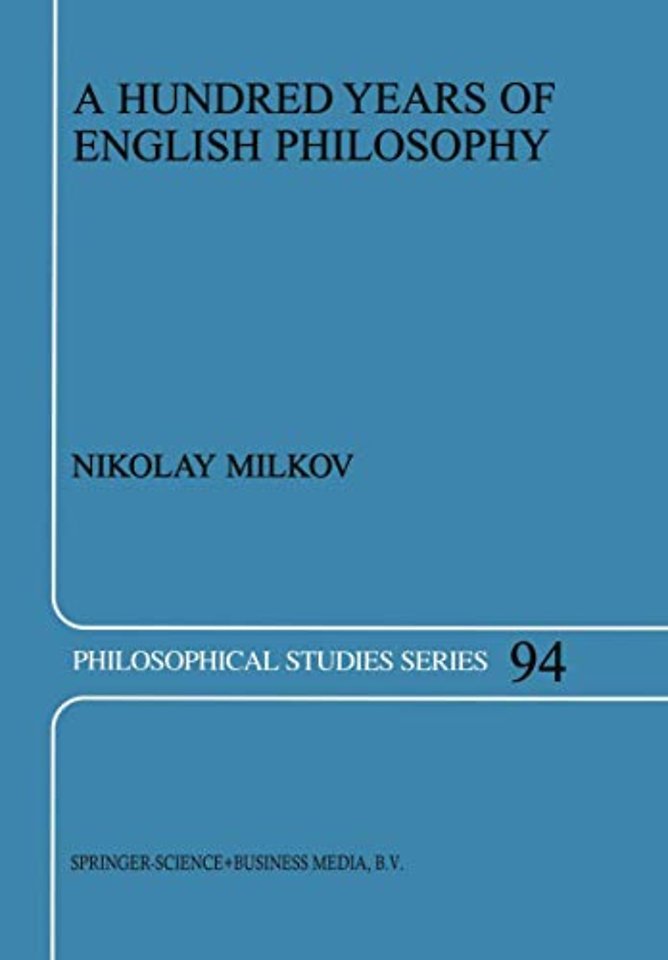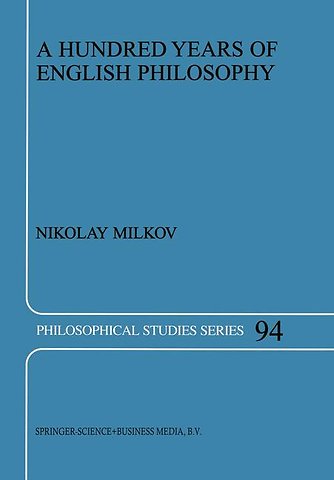A Hundred Years of English Philosophy
Samenvatting
This investigation is a historical review of twentieth-century analytical philosophy in England. In seven chapters, the intellectual development of its most prominent representatives - Moore, Russell, Wittgenstein, Ryle, Austin, Strawson, Dummett - is traced. The book offers synopses of the main philosophical texts of these seven philosophers. It will serve as a reference book covering all the central problems discussed by these seven authors.
Specificaties
Inhoudsopgave
<P>Introduction. <STRONG>1.</STRONG> Objectives and Authors. <STRONG>2.</STRONG> Oxbridge Circles and Schools. </P>
<P><STRONG>I: Cambridge</STRONG> <STRONG>Analytical Philosophy. 1.</STRONG> G.E. Moore - The Project for a New Philosophy. <STRONG>1.</STRONG> Moore's Development in the Ambience of Cambridge Esoteric Philosophy. <STRONG>2.</STRONG> Examination of Moore's Method. <STRONG>3.</STRONG> Basic Points of Moore's Philosophy. <STRONG>4.</STRONG> <EM>Tractatus Logico-Ethicus</EM>. <STRONG>5.</STRONG> Epistemology and Truth. <STRONG>6.</STRONG> First Theses of 'Analytical Scholastics'. <STRONG>7.</STRONG> The Middle Moore. <STRONG>8.</STRONG> The Later Moore. <STRONG>9.</STRONG> Epilogue. Moore's Archimedean Point. <STRONG>2:</STRONG> <STRONG>Bertrand Russell - The New Method as a Logic.</STRONG> <STRONG>1.</STRONG> Russell Rejects Neo-Hegelianism. <STRONG>2.</STRONG> The Turn of 1900 and Russell's Paradox. <STRONG>4.</STRONG> Russell's Theory of Names. <STRONG>5.</STRONG> The Historical Context of Russell's Theory of Descriptions. <STRONG>6.</STRONG> Logic as the Organon of Philosophy. <STRONG>7.</STRONG> Russell's Logic as <EM>Calculus Ratiocinator</EM>. <STRONG>8.</STRONG> Epistemology and Ontology. <STRONG>3: Ludwig Wittgenstein - Logical Meditations. 1.</STRONG> Wittgenstein's Method and System. <STRONG>2.</STRONG> Logical Meditations. <STRONG>3.</STRONG> Objects, States of Affairs, Propositions. <STRONG>4.</STRONG> Implicit Metaphysics and Epistemology. <STRONG>5.</STRONG> The Creative Turn. <STRONG>6.</STRONG> The Dynamic Turn. <STRONG>7.</STRONG> Was Wittgenstein a Philosopher of Language? </P>
<P>II: Oxford Analytical Philosophy. <STRONG>4: Gilbert Ryle - The Analytical Method Explained. 1.</STRONG> First Theses in Philosophy. <STRONG>2.</STRONG> Pursuit of Philosophical Logic. <STRONG>3.</STRONG> The Method of the Mind. <STRONG>4.</STRONG> Ryle's Philosophical Psychology. <STRONG>5.</STRONG> Conceptual Examination. <STRONG>6. Ryle's Plato. <STRONG>7.</STRONG> The Unrealised Project on Thinking. <STRONG>5: J.L. Austin - Analytical Philosophy as a Strict Science. 1.</STRONG> Introduction. <STRONG>2.</STRONG> The Pre-War Austin. <STRONG>3.</STRONG> The Turn of 1946. <STRONG>4.</STRONG> Radical Epistemology. <STRONG>5.</STRONG> Linguistic Phenomenology. <STRONG>6.</STRONG> Austin as a Philosopher. <STRONG>7.</STRONG> Linguistic Phenomenology Applied. <STRONG>8.</STRONG> Doing Things with Words. <STRONG>9.</STRONG> `Philosophical Fun'. <STRONG>6: P.F. Strawson - The Justification Turn. 1.</STRONG> Forming Philosophical Institutions. <STRONG>2.</STRONG> Strawson's 'Logical Neo-Traditionalism'. <STRONG>3.</STRONG> Influences. <STRONG>4.</STRONG> The Problem of Individuals. <STRONG>5.</STRONG> Reconstruction of Strawson's Scheme of Individuals. <STRONG>6.</STRONG> Logical Subjects. <STRONG>7.</STRONG> Subject and Predicate Again. <STRONG>8.</STRONG> Strawson's `Dilemmas'. <STRONG>7:</STRONG> <STRONG>Michael Dummett - Revision of the Project. 1.</STRONG> Dummett's Approach. <STRONG>2.</STRONG> Impacts. <STRONG>3.</STRONG> Frege's Philosophy of Language. <STRONG>4.</STRONG> Frege's Philosophy of Mathematics. <STRONG>5.</STRONG> Basic Ideas. <STRONG>6.</STRONG> Dummett's Philosophy of Language. <STRONG>7.</STRONG> Theory of Meaning. <STRONG>8.</STRONG> Dummett's Philosophy of Mathematics. </P>
<P>Bibliography. Index of Names. Index of Concepts. </P>

